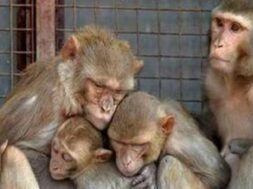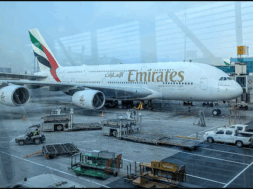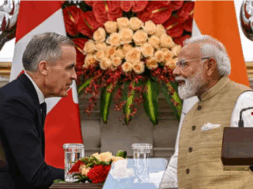
Monkey biz: After buying dogs and donkeys from Pakistan, China set to buy monkeys from Sri Lanka!
Virendra Pandit
New Delhi: Even after the world accused it of being the epicenter of the Covid-19 pandemic, believed to have originated from the wet markets of Wuhan, China has refused to learn that it cannot fiddle with nature. After buying dogs and donkeys from Pakistan in 2022, it is now set to purchase monkeys from Sri Lanka—which may end up on the dining tables of filthy-rich Chinese.
The media reported on Thursday that China is buying 100,000 endangered monkeys from Sri Lanka for “experiments.”
So many monkeys for “experiments?” And that too endangered species of primates?
It may prove disastrous to the ecological balance in Sri Lanka and further disrupt the already fragile global food chain.
Interestingly, while Sri Lanka confirmed China’s request for importing as many as 100,000 toque macaque monkeys, Beijing’s embassy in Colombo claimed it is “unaware of Sri Lanka exporting 100 thousand of endangered” toque macaque monkeys” to a Chinese private company for “experimental purposes.”
In the fully-state controlled Chinese economy, no company is exactly a private enterprise—if it is one, it is only to hoodwink the rest of the world. For centuries, the Chinese have famously boasted that anything that walks is their food!
Cash-strapped Sri Lanka, which declared bankruptcy in April 2022 amid unprecedented economic and political upheaval, has been trying to shore up its foreign reserves by such controversial moves, amidst protests from environmental groups against the fresh deal.
According to Gunadasa Samarasinghe, a top bureaucrat in Sri Lanka’s Ministry of Agriculture, a privately-owned Chinese company connected to Zoological Gardens, which are animal breeders, had made the request to his ministry.
“We will not send the whole 100,000 numbers in one lot. But we considered the request because of the crop damage caused by the monkeys in several parts of Sri Lanka. They will not be taken from conserved areas. The focus will be only in the cultivation areas.”
The toque macaque monkey is native to Sri Lanka and is classified as endangered on the International Union for Conservation of Nature (IUCN) red list.
Last week, Sri Lanka’s Agriculture Minister Mahinda Amaraweera said that China’s request for 100,000 monkeys to be exhibited at over 1,000 Chinese zoos could be considered. That is, each zoo will have a thousand exhibits of these monkeys!
“They want these monkeys for their zoos,” he was quoted as saying. Sri Lanka bans almost all live animal exports but the proposed sale comes at a time when the country is facing its worst-ever economic crisis.
Cash-strapped Sri Lanka has removed several species from its protected list this year, including all three of its monkey species as well as peacocks and wild boars, allowing farmers to kill them.
The toque macaque is known to destroy crops in several parts of Sri Lanka, and even sometimes attacks people.
Sri Lanka has an estimated monkey population of between two and three million.
Beijing’s Embassy in Colombo said the Chinese National Forestry and Grassland Administration, the regulator handling the import and export of wild animals and plants, had not received any such requests to allow the monkey imports from Sri Lanka.
Claiming that China is among the top countries in the world in terms of wildlife protection legislation and law enforcement, the embassy said the country has already adopted its Wildlife Protection Law in 1988 with several amendments afterward and is a contracting party of the Convention on International Trade in Endangered Species of Wild Fauna and Flora (CITES).
“The Chinese government always attaches great importance to wildlife protection and actively fulfills international obligations,” the embassy said on Tuesday.
But it is well known that many Chinese, who are used to consuming exotic animals, had a flourished wed market economy in several parts of the country where they ordered live animals to be used for their cuisine. Even the virus that caused the Covid-19 pandemic worldwide was believed to have spread from such a wet market in the central Chinese city of Wuhan.
That is why, nobody is sure if the Sri Lankan monkeys would also end up on Chinese dining tables.
Already, China has been importing dogs and donkeys from its vassal countries like Pakistan. Last year, Pakistan’s Ministry of Commerce and the Senate Standing Committee said China was importing dogs and donkeys. Senator Abdul Qadir said the Chinese Ambassador had mentioned this animal export arrangement on previous occasions as well.
Pakistan has a population of over 5.7 million donkeys. The Punjab government in Pakistan set up a donkey farm on over 3,000 acres in the Okara district to ramp up the export of the animal.
While Pakistan has the world’s third largest population of donkeys, China uses the animal’s hide in making traditional Chinese medicines.














